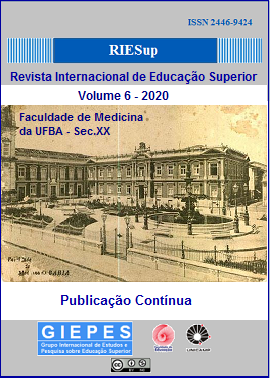Abstract
The research discusses the historical ideologies transmitted by cinematography, which cause the loss of meaning, insensitivity and intellectual stiffness by the absence of (self) criticism. Thus, this hermeneutic type of study proposes to look at the conceptions of gender and sexuality conveyed by cinema, in an attempt to review their repercussions on the experience of educational thinking. The shared problems need an attentive and critical-reflexive sensitivity to productions, to resist the spread of inequalities, exclusions and prejudices, the only way to generate new understandings through intersubjective processes, breaking with the fads to make this device an aggregating vehicle of experiences. humanizing social practices oriented towards the recognition of differences. Underlying film productions is the dominance of the cultural industry, which in its market logic promotes the repetition of certain discourses until they become passive truths in the face of the world. In this scenario marked by technical reproducibility, we show that there is little resistance from the film industry, which reveals gender and sexuality paradigms, highlighting contemporary issues. We conclude that these technological artifacts in education need to serve as impulses to rethink human action under penalty of the teaching processes reproducing exclusion, prejudice, uniformity and insensitivity to others and the plurality of experiences. It is about correcting the deformations of recognition through re-education that enhances human differences and social recognition.
References
ADORNO, Theodor Ludwig Wiesengrund. Indústria Cultural e Sociedade. 5. ed. Trad. Juba Elisabeth Levy.São Paulo: Paz e Terra, 2009.
ADORNO, Theodor Ludwig Wiesengrund; Horkheimer, Max. A Dialética do Esclarecimento. Rio de Janeiro: Jorge Zahar, 1985.
ARISTÓTELES. A Política. 1. ed. Tradução Roberto Leal Ferreira. São Paulo: Martins Fontes, 1991.
BENJAMIN, Walter. Magia e técnica, arte e política: ensaios sobre literatura e história da cultura. São Paulo: Brasiliense, 1994.
BORDWELL, David. Estudos de cinema hoje e as vicissitudes da grande teoria. In: Ramos, F. (org.). Teoria contemporânea do cinema. Volume I. São Paulo: Editora Senac, 2005.
CONTE, Elaine. Aporias da performance na educação. (Tese de Doutorado em Educação). Universidade Federal do Rio Grande do Sul, Porto Alegre, 2012.
FEITOSA, Sônia de Melo; LIMA, Marwyla Gomes de; MEDEIROS, Milena Gomes de. Patriarcado e forró: uma análise de gênero. In: Anais... Seminário Internacional Fazendo Gênero 9: Diásporas, Diversidades, Deslocamentos. Florianópolis, 2010.
GADAMER, Hans-Georg. Verdade e método II: complementos e índice. Trad. Ênio Paulo Giachini. Petrópolis, RJ: Vozes, 2002.
GUBERNIKOFF, Giselle. A imagem: representação da mulher no cinema. Revista conexão - Comunicação e Cultura, Caxias do Sul, vol. 8, n. 15, pp. 65-77, 2009. Disponível em: http://www.ucs.br/etc/revistas/index.php/conexao/article/view/113/104. Acesso em: 05 fev. 2019.
KAPLAN, Ann. A Mulher e o Cinema: os dois lados da câmera. Rio de Janeiro: Rocco, 1995.
KAPLAN, Ann. A mulher no cinema segundo Ann Kaplan - entrevista a Denise Lopes. Revista Contracampo, Rio de Janeiro, v.7, n. 1, p. 212, 2002.
LOUREIRO, Robson. Educação, cinema e estética: elementos para uma reeducação do olhar. Educação e Realidade, Porto Alegre. v. 33, n.1, pp. 135-154, 2008. Disponível em: http://seer.ufrgs.br/educacaoerealidade/article/view/6691. Acesso em: 16 fev. 2019.
MALUF, Sônia Weidner. Corporalidade e desejo: Tudo sobre minha mãe e o gênero na margem. Revista Estudos Feministas, ano 10, p. 143-153, 2002. Disponível em: http://marcoaureliosc.com.br/cineantropo/maluf2.pdf. Acesso em: 05 fev. 2019.
MULVEY, Laura. Entrevista. Revista Estudos Feministas, Florianópolis, 13 (2), pp. 351-362, 2005. Disponível em: http://www.scielo.br/pdf/ref/v13n2/26887.pdf. Acesso em: 04 fev. 2019.
NAPOLITANO, Marcos. Como usar o cinema em sala de aula. 5. ed. São Paulo: Contexto, 2011.
A Revista Internacional de Educação Superior utiliza a licença do Creative Commons (CC), preservando assim, a integridade dos artigos em ambiente de acesso aberto.


